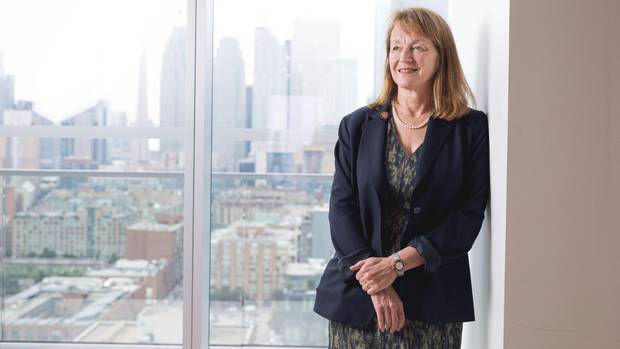Talking during a break on a whirlwind trip to Canada, Imperial College president Alice Gast pulls out a copy of Thursday morning’s Financial Times. A column by British Home Secretary Amber Rudd has given new hope to the leader of the London-based science, engineering and medicine-focused university, ranked among the world’s top 10 postsecondary institutions.
Since last year’s vote for Brexit, the university sector in Britain has weathered its share of bad news. While many Canadian universities have seen the number of applications from international students rise by 25 per cent or more and are on a drive to recruit international faculty, those in Britain are facing anemic growth in overseas students. Government policies aimed at showing Theresa May’s government can reduce the number of immigrants are affecting student visas, and have added to British universities’ anxiety that Brexit will lead to the flight of top academics and the loss of hundreds of millions in European research funds.
So the announcement by Ms. Rudd that the Conservative government will listen to concerns about Brexit from universities, industry and unions is a first positive shift.
“It is so important that we keep our doors open and that our international students and scholars feel welcome,” said Dr. Gast, an American with a PhD in chemical engineering from Princeton University. “I’m not as focused on the numbers, as getting the message right that there is a value in our international community.”
This was not the fight Dr. Gast expected to wage when she took over the top post at Imperial in 2014 after leading Lehigh University in Pennsylvania and many years at MIT. But now, with political forces in Europe and the United States determined to build walls, universities must showcase and explain the economic and social benefits of continuing to lower rather than raise barriers to international co-operation. That means that while universities will continue to compete for international talent, they also need to help those who feel globalization has made their life worse, she said.
It is not an easy role for an elite university which admits one in roughly every seven applicants. But Dr. Gast talked about how Imperial is taking it on and why the university hopes it will collaborate rather than compete with Canada for the world’s best and brightest.
Canada has been very successful this year in recruiting international students and we have put new funds, more than $100-million, toward a hunt for global faculty as well. How can you keep up?
I look at Canada as a collaborator as well as competition for talent. I am more pleased that Canada does well because we look for graduate spots to place our talented students – the open flow of talent is a positive thing.
One of the things of putting people from different backgrounds together is that you approach things in different ways, whether it’s different industries, different schooling system or different training.
Can you convince the Daily Mail, which has run quite negative stories about ‘visa overstayers’ among international students, or the British government, that innovation comes out of diversity?
As you look across the U.K., international students are not viewed as a problem. We could make a better case for how new ideas from students and graduates from around the world can become a larger venture. You have Google Ventures [GV] and GE Ventures and these larger corporations placing their bets on new entrepreneurs. We need to think about how to place our bets on those people.
How do you speak to the people who are left out? The people who don’t have their ideas funded or scooped up by venture capital?
It’s a challenge, because higher-education institutions are starting to be viewed as part of the problem, not the solution. One of the things I am most excited about is our new White City campus. We have created makerspaces and hack spaces so that students from the schools nearby, in an underprivileged neighbourhood, can work on their own projects or work with projects with our students.
It does feel like a small effort in a large problem, but that sense of accomplishment is something we need to replicate if we are successful. We can be a convenor for groups in the community doing great things. We don’t come in and say ‘We can do this.’ We say ‘How can we help you?’
Will those kind of efforts help you speak to the value of universities in general?
It’s incumbent on us now to spread the word on the contribution our research and our international community makes not just on London, but on other parts of the U.K. It would resonate if people knew: That bridge comes from a design from Imperial College London. This new therapy that my friend had came from a discovery that was made with European research funds.
Only a few years ago, Britain was open to the world. How do you feel about fighting just to defend those gains now?
I’m a huge proponent of international education. It’s important that we provide to communities that feel left out of globalization – as well as a technological revolution – the means to change their outcome for themselves, to have hope. Our institutions – governments, universities – are failing to provide that path forward. The opportunity is with kids and with finding ways to help them use their capabilities.
SIMONA CHIOSE – EDUCATION REPORTER
The Globe and Mail
Published Thursday, Jul. 27, 2017 10:17PM EDT
Last updated Thursday, Jul. 27, 2017 10:17PM EDT

